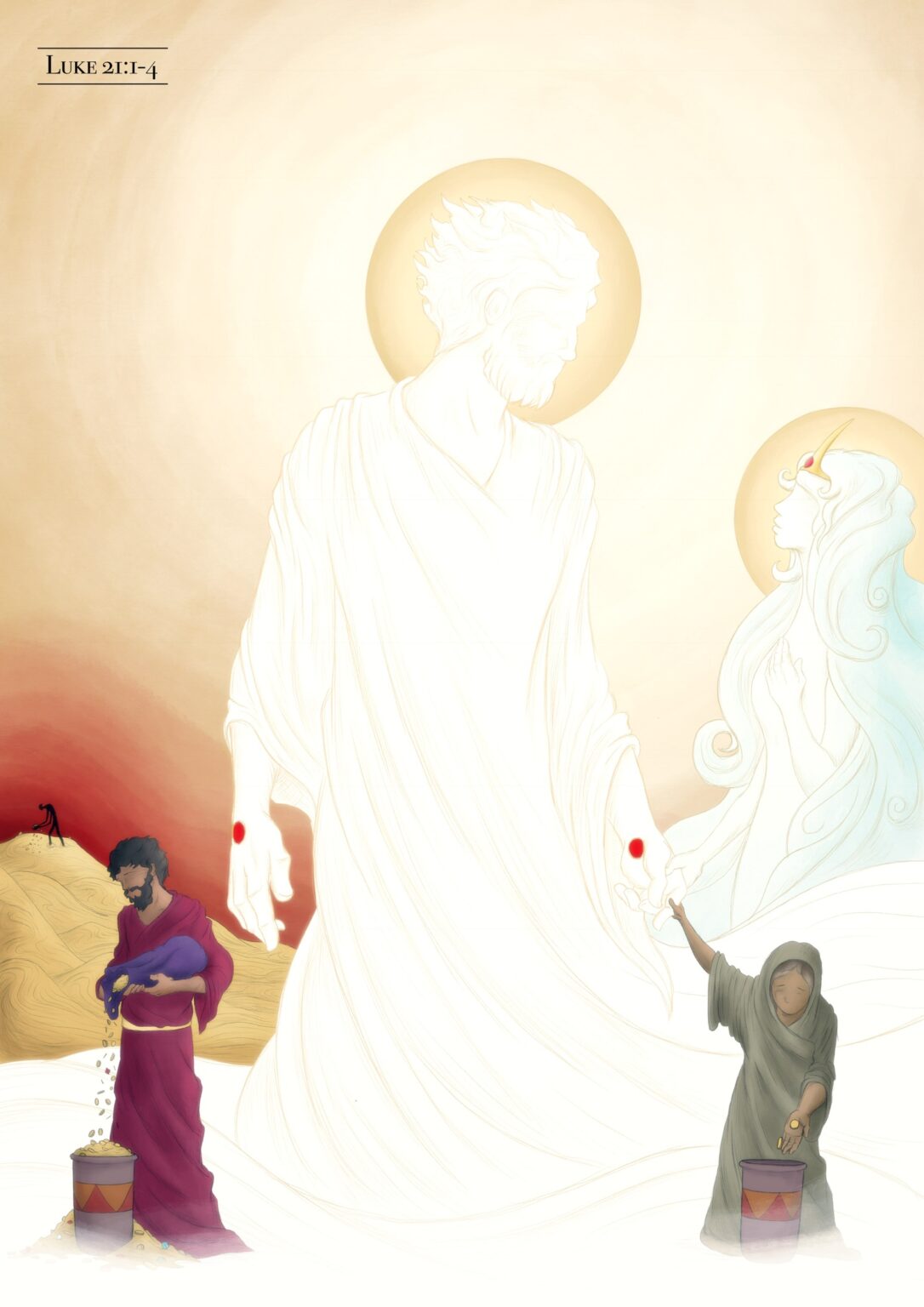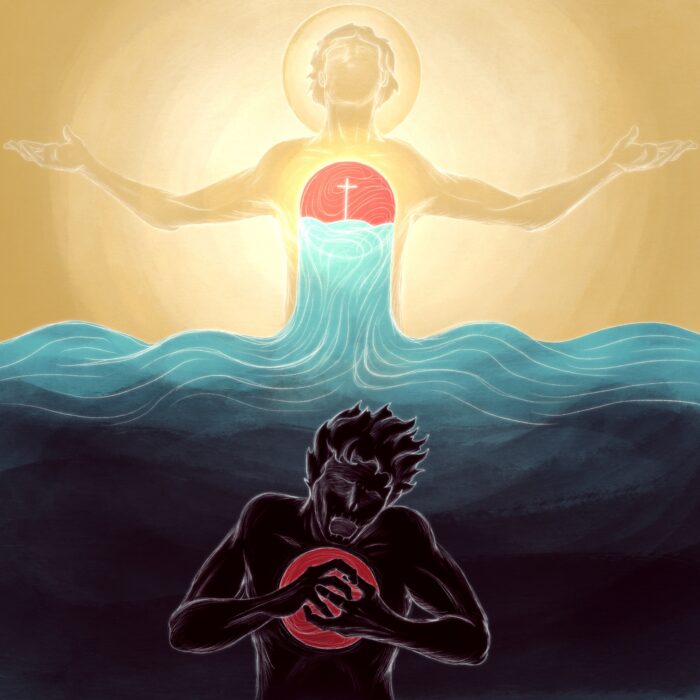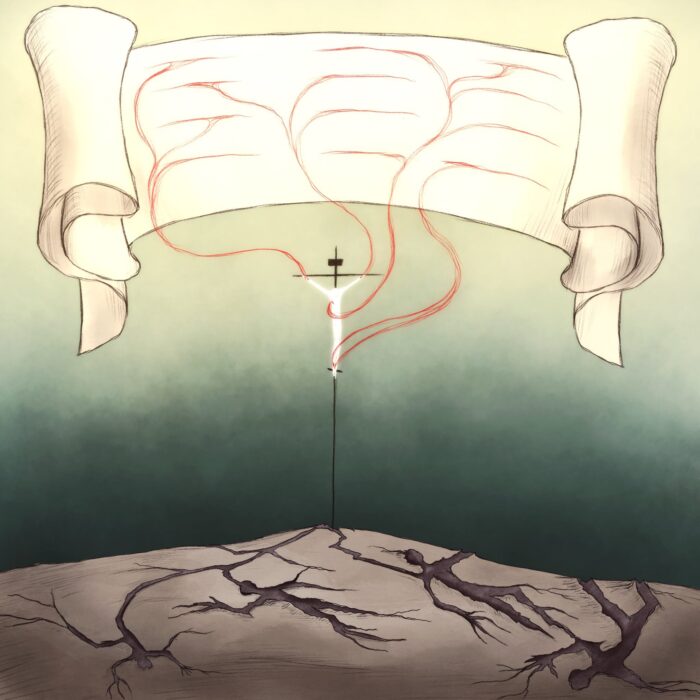Luke 21:1-4

The Passage Explained
In Luke 21:1-4, Jesus observes a poor widow putting two small coins into the offering box at the temple. At the same time there are many rich people coming to place their gifts in the box as well. We are led to conclude that the rich were being less than discreet about the quantity of their giving since Jesus’ words to His disciples imply that everyone can see the vastly greater amount the rich are giving in relation to the poor widow. Having observed the scene, Jesus offers His analysis:
“Truly, I tell you, this poor widow has put in more than all of them. For they all contributed out of their abundance, but she out of her poverty put in all she had to live on.”
With these words, Jesus teaches us that the living God is not concerned about the dollar amount that goes into the offering box. He is not intrinsically more pleased or glorified by a larger gift than a smaller one. This should be no surprise, we read in Psalm 50:10 that the “cattle on a thousand hills” belong to Him. God has been, is now, and will never be in need, and the collective wealth of the human species adds nothing to His power or majesty. What, then, is the “worth” of an offering to the Lord (whether of animal or money or time or skill or a life)? Jesus points us toward the answer when He says that the poor widow put in more than anyone else.
The offerings of God’s people are measured not by quantity or quality, but by the heart of faith that pours them out. This woman put in more than anyone else because–in relation to them–she was putting in 100% of her estate. But I don’t think the percentage element is Jesus’ point here–at least not His main point. I do not believe that the take away from this encounter is “always give away all of your money.” For some that might be what is required, but I think Christ’s commendation of this woman springs from something else implied in the words, “all she had to live on.” By giving all that she had to live on, she was placing herself wholly and without reserve into the hands of YHWH.
A widow in Jesus’ culture would have been utterly destitute. She would have no husband and–presumably–no children to care for her. This woman is the epitome of the “least of these,” she is needy in every way, and yet–precisely because of that need–she has greatly glorified her God by entrusting herself to His sovereign care. She has manifestly refused to worship Mammon and has instead turned what little the Lord has given her into a servant of her greater dependence upon and exaltation of her Provider. The widow’s offering is precious beyond the extravagance of the rich because, with those two coins, she has exalted YHWH as her all satisfying portion by giving her whole self over to Him, saying–with the one who would no doubt become her Savior–“into your hands I commit my spirit” (Lk 23:46). And while we hear nothing more of this widow, I can say with nearly full confidence that she was well cared for…
The Picture Explained
In this picture, then, I tried to emphasize the contrast between the rich man who gives lightly out of his abundance, and the poor widow who gives profoundly out of her lack. The rich man faces self confidently away from the Lord as he gives his money because his hope and joy are not in God but in his wealth and the honor the show of wealth at the temple earns for him in the eyes of other men. The widow, however, holds tightly to her unseen Lord’s hand as she–metaphorically–pours out her life into the offering box with the other. This posture is intended to emphasize the fact that her giving is a manifestation of her dependence upon her covenant Lord to supply her needs.
One of the coins in the widow’s hand visually echoes the wound in the hand she is holding. This is because I think we can see something of the heart of Christ at the cross foreshadowed in this woman’s offering. The small, poignant melody of the widow’s faith-fueled self-giving at the temple will find it’s consummation and crescendo in the infinite self-giving of the divine Son on Calvary.
Finally, in the background the two givers are represented in light of their heart’s relationship to the Lord. The heart of the rich man is small and miserly, turned from the light of Christ toward the rusty glow of Mammon and enamored with the treasures he’s stored on earth. On the other hand, the heart of the widow is a queen of heaven, as it were, holding fast to her Lord and gazing with hope and confidence into his face.
When the Christian looks into the “face” of her God, she sees the Son who was rich and yet for her sake become poor so that she, through His poverty, might become rich (2 Corinthians 8:9)….and if this one is our Lord and God (John 20:28) and the Author of our Days (Ps. 139:16), can we–with the widow–not pour our whole selves out for His sake, knowing that His Father and ours will give us what is needful (Matt.6:32, 7:7-11; Romans 8:32)? May He give us–give me–grace and wisdom and faith and boldness to do so. In Christ’s name, amen.




